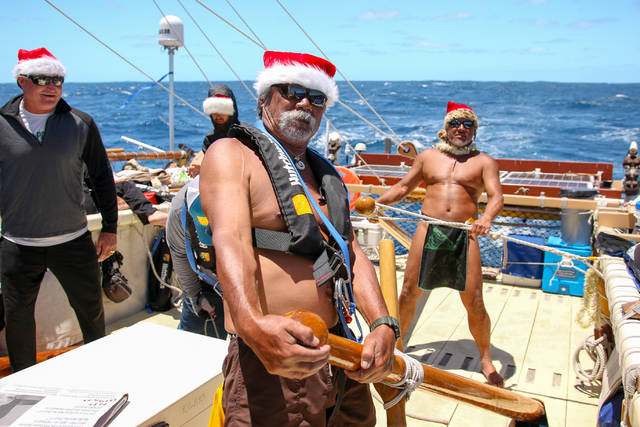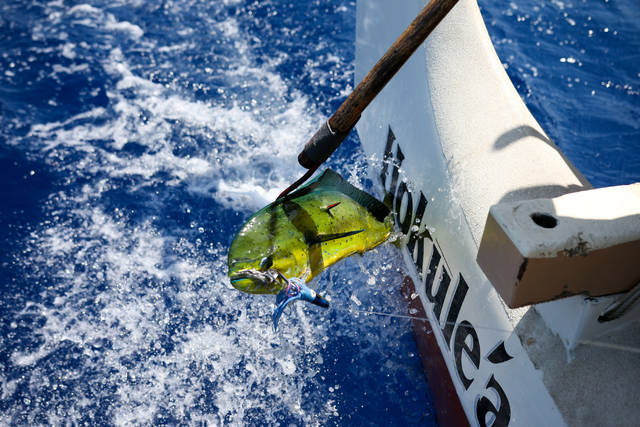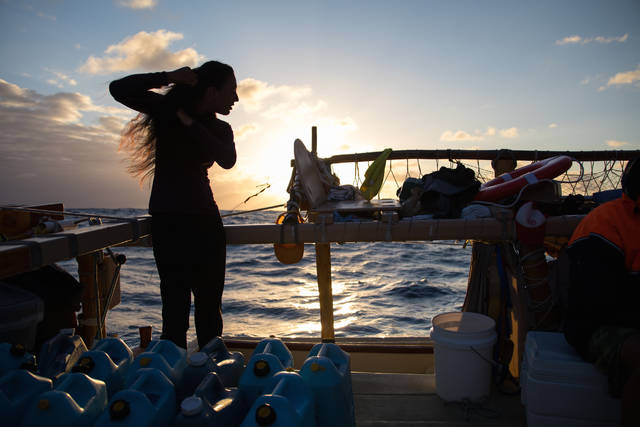Journey tests Hokule‘a crews’ strengths, but also offers liberation

COURTESY ‘OIWI TV
The crew celebrates Mele Kalikimaka (Merry Christmas) on board the Hokule‘a a few days after departing Cape Town, South Africa, and heading across the Atlantic Ocean for Natal, Brazil.

COURTESY ‘OIWI TV
Cleaning the canoe is a collective effort on any voyage. Passing rain is a welcome blessing to freshen the crew and canoe. Even in downtime, crew members will often grab a brush to clean the deck.

COURTESY ‘OIWI TV
Fresh fish is always welcome on the canoes. Crew members rely on hand lines to pull in the normal catches of ahi, aku, ono and mahimahi. Once a fish has been caught, the lines are normally brought in for the day since there is no refrigeration to store excess fish.

COURTESY ‘OIWI TV
A crew member brushes her hair, silhouetted by the rising sun. Showers are taken behind a curtain in the stern, using salt water and soap specially made for saltwater use. Salt water is also used for washing dishes.

COURTESY ‘OIWI TV
Apprentice navigator Haunani Kane spends some downtime in her bunk. With few spaces to hide from the natural elements, the bunk spaces are a welcome place to rest.





It’s a gritty, spartan existence that often tests a sailor’s limits.
There’s the sleep deprivation, the constant roll and churn of the blue-water ocean, the sustained physical grind and focus to keep the canoe on course.
“There are times when you’re cold beyond cold … tired beyond tired, and you’ve still got to wake up (and) be there for the crew,” said Kaniela Hoku Lyman-Mersereau, who sailed aboard the Hokule‘a to New Zealand, among other legs.
>> View the special section: The Homecoming
“Your mental strength is worth more than your physical strength a lot of times,” added Kula Barbieto, who has sailed on the Hokule‘a since 2009.
But give a few days for the shock to wear off and life aboard a sailing canoe can also be liberating, transformative. Eventually, crew members embrace a routine free of all but the most basic supplies. Surrounded by ocean wilderness, their senses grow sharper. Their awareness of the natural cues around them grows stronger.
Don't miss out on what's happening!
Stay in touch with breaking news, as it happens, conveniently in your email inbox. It's FREE!
The canoe doesn’t feel so crowded after all.
“Physically her dimensions are only so much, and yet there always seems to be enough space for everyone,” crew member Eric Co said of the Hokule‘a.
The Malama Honua voyage saw 31 crew changes, and each leg was its own unique adventure. Some were weeks-long sails on the open sea where crews didn’t see land for days. Other sails hugged the coastline with frequent stops, never losing sight of land.
Some legs were island-hops separated by a few days of sailing. On others an escort vessel carefully towed the Hokule‘a down narrow waterways and canals, sometimes with barely a foot of clearance space on either side of the canoe.
Volunteer crews prepped for all sorts of weather. When the temperatures got frigid, particularly at the more extreme northern and southern latitudes, they would bundle up in parkas and foul-weather gear. In the warmer tropical zones, they might shed layers as the canoe passed through a storm squall to enjoy a freshwater rain bath.
On clear nights they would marvel at the Milky Way. On cold ones they would share stories over steaming bowls of saimin noodles or stew. Occasionally, the fishing lines trailing the Hokule‘a would catch a fresh mahimahi or some other fish, delivering a treasured meal from the sea.
They strove to stay as positive as they could, even when things got really tough. In 2014, when one of the Hokule‘a’s wooden booms snapped off the coast of Tonga, there was “no yelling, no swearing,” Lyman-Mersereau recalled in a recent panel discussion.
“OK, a little bit of swearing,” he added. “Things break. You don’t stress out. You’ve got to fix them.”
Many new crew members arrived aboard the canoe as strangers. Personalities sometimes clashed. But by the time their leg ended, they often considered one another family.
For Lyman-Mersereau and others, the biggest challenge of all was going home.
Added Barbieto, “You don’t just get off the canoe and go on with your life. Those values stay with you.”




